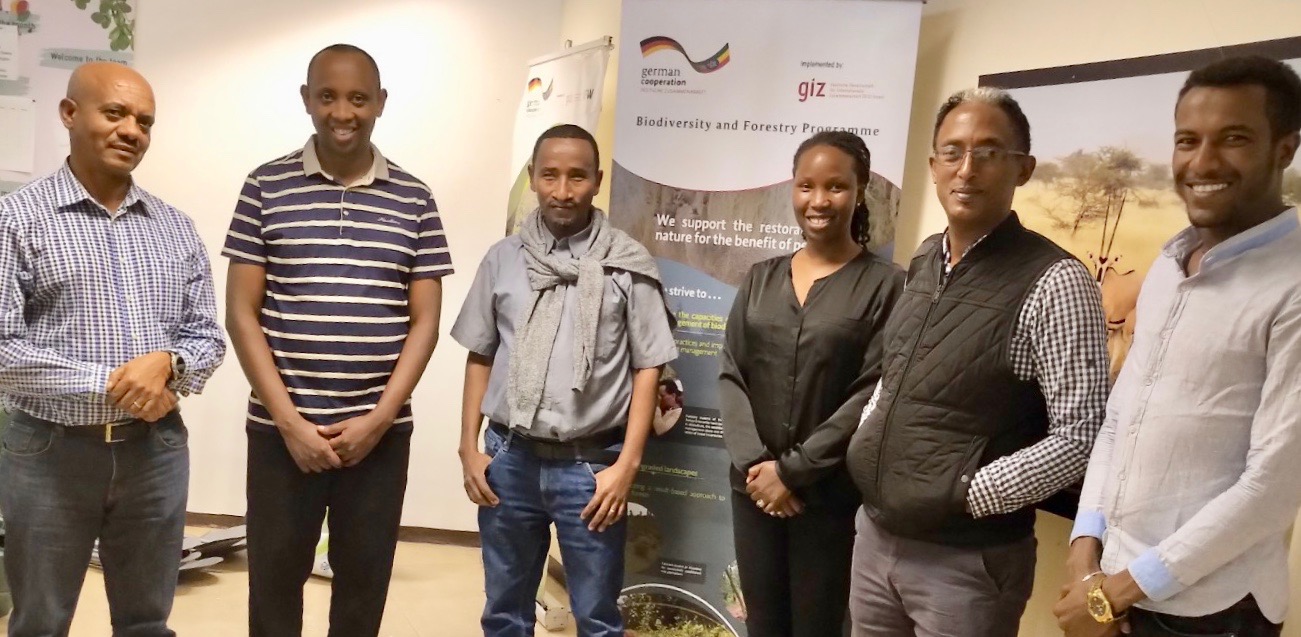The Regional Resource Hub is a regional centre that compiles and analyzes relevant protected area data and provides information to support field interventions, policies dialogues and decision-making processes at local, national and regional levels. It is hosted by the Regional Centre for Mapping Resources for Development (RCMRD) and covers the 24 countries in Eastern and Southern Africa.
The main purpose of the pilot visit was an information gathering and networking exercise to (i) understand the priorities of Ethiopia in terms of protected areas management, governance and equity, (ii) inform the conservation partners about the Regional Resource Hub mission, function and activities and (iii) identify opportunities for partnership in order to support informed decision making in favor of the country sustainable development.
During the visit, members of the BIOPAMA team from IUCN, the Joint Research Centre of the European Commission and RCMRD engaged with Ethiopian conservation actors, including:
- Ethiopian Wildlife Conservation Authority
- Ethiopian Biodiversity Institute (EBI)
- Ethiopian Environment, Forest and Climate Change Commission (EEFCCC)
- Rift Valley Lakes Basin Authority
- Ethiopian Remote Sensing Agency
- Southern Nations, Nationalities and the People Regional State (SNNPRS) Culture, Sport and Tourism Bureau
- Senkele Swayne’s Hartebeest Sanctuary
- Frankfurt Zoological Society (FZS)
- Population, Health and Environment Ethiopia (PHE)
- Enhance Management Effectiveness of Protected Areas (GEF6/EMEPA)
- The Deutsche Gesellschaft für Internationale Zusammenarbeit (GIZ)
- The Delegation of the European Union in Addis Ababa
- Biotope Endowment Fund
- Wildlife Society of Ethiopia
- Nech-Sar National Park management and surrounding community-based organizations.
Visit outcomes
The visits were very useful to understand the challenges and priorities of Ethiopian conservation partners. Like many countries in the region, Ethiopia has important ongoing initiatives that could benefit from the Regional Resource Hub to promote more coordinated knowledge sharing and communication activities at intra-national and regional levels, which in turn will support better learning, management efficacy and advocacy campaigns.
A list of priorities in terms of capacity building was identified and is mainly related to the development of integrated park management plans and engagement of surrounding communities, fire protection strategies and support to human-wildlife conflict.
The national actors have also demonstrated interest in engaging with the Regional Resource Hub to promote management effectiveness and social assessments, biodiversity mapping and development of data and information sharing protocols.
The update of forest information and review of the protected area demarcation are some of the specific activities mentioned as relevant for the coming months.
Way forward
The follow-up steps for the pilot visit are:
- The Regional Resource Hub will share data management guidelines and data sharing framework to assist with the development of a data-sharing protocol.
- A collective effort will be made to update information from Ethiopia in the World Database of Protected Areas (WDPA).
- The RRH team will get in touch with other partners, including academic institutions like Hawassa University, Arba Minch University and the University of Addis Ababa.
- BIOPAMA team will explore opportunities for capacity building and other activities that correspond to Ethiopia’s priorities, such as management effectiveness assessments and pilot tests of social and governance assessment with partner organizations.
The support offered by BIOPAMA and the Regional Resource Hub to improve and strengthen management and governance in the protected and conserved areas in Ethiopia can be implemented through capacity development activities, the Action Component – the BIOPAMA grant-making facility, and partnership with other programs and donors.
Related News

prev








